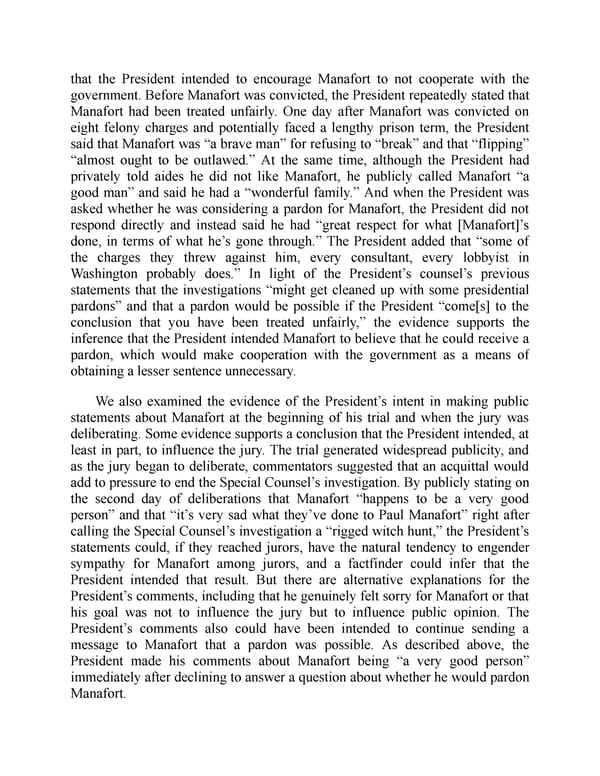that the President intended to encourage Manafort to not cooperate with the government. Before Manafort was convicted, the President repeatedly stated that Manafort had been treated unfairly. One day after Manafort was convicted on eight felony charges and potentially faced a lengthy prison term, the President said that Manafort was “a brave man” for refusing to “break” and that “flipping” “almost ought to be outlawed.” At the same time, although the President had privately told aides he did not like Manafort, he publicly called Manafort “a good man” and said he had a “wonderful family.” And when the President was asked whether he was considering a pardon for Manafort, the President did not respond directly and instead said he had “great respect for what [Manafort]’s done, in terms of what he’s gone through.” The President added that “some of the charges they threw against him, every consultant, every lobbyist in Washington probably does.” In light of the President’s counsel’s previous statements that the investigations “might get cleaned up with some presidential pardons” and that a pardon would be possible if the President “come[s] to the conclusion that you have been treated unfairly,” the evidence supports the inference that the President intended Manafort to believe that he could receive a pardon, which would make cooperation with the government as a means of obtaining a lesser sentence unnecessary. We also examined the evidence of the President’s intent in making public statements about Manafort at the beginning of his trial and when the jury was deliberating. Some evidence supports a conclusion that the President intended, at least in part, to influence the jury. The trial generated widespread publicity, and as the jury began to deliberate, commentators suggested that an acquittal would add to pressure to end the Special Counsel’s investigation. By publicly stating on the second day of deliberations that Manafort “happens to be a very good person” and that “it’s very sad what they’ve done to Paul Manafort” right after calling the Special Counsel’s investigation a “rigged witch hunt,” the President’s statements could, if they reached jurors, have the natural tendency to engender sympathy for Manafort among jurors, and a factfinder could infer that the President intended that result. But there are alternative explanations for the President’s comments, including that he genuinely felt sorry for Manafort or that his goal was not to influence the jury but to influence public opinion. The President’s comments also could have been intended to continue sending a message to Manafort that a pardon was possible. As described above, the President made his comments about Manafort being “a very good person” immediately after declining to answer a question about whether he would pardon Manafort.
 Mueller Report PDF Page 397 Page 399
Mueller Report PDF Page 397 Page 399